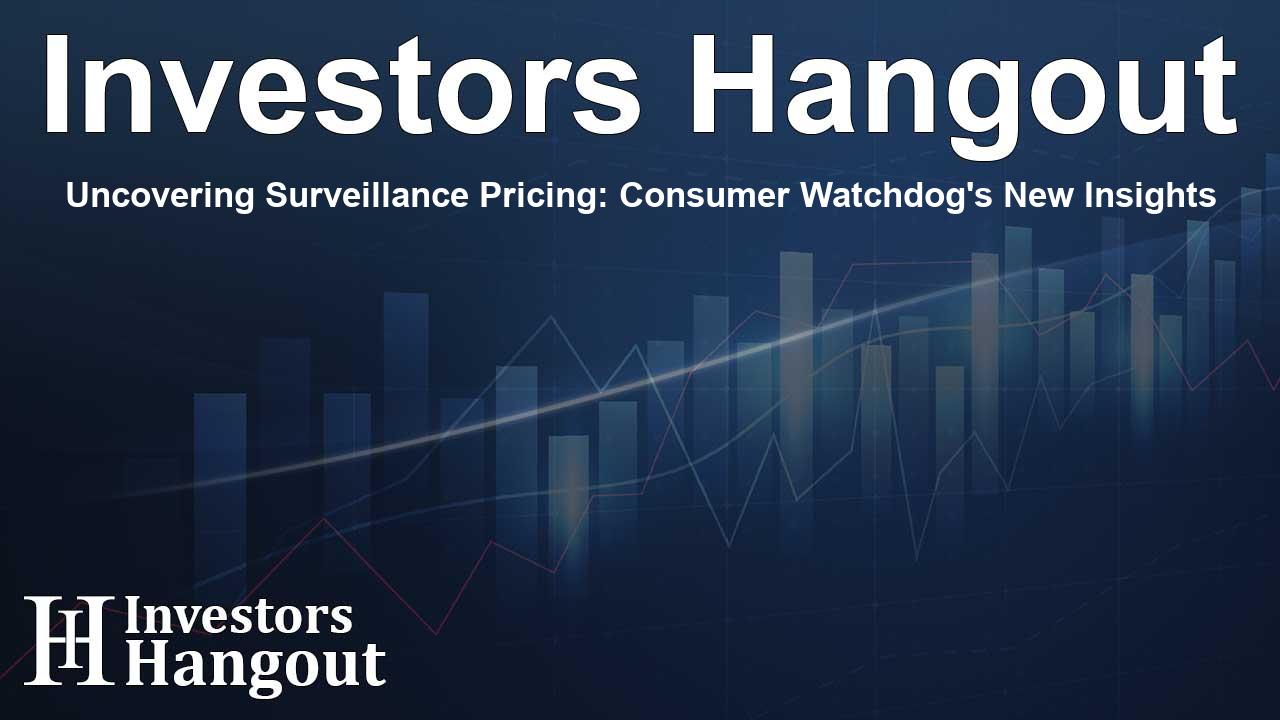Uncovering Surveillance Pricing: Consumer Watchdog's New Insights

Understanding Surveillance Pricing in Today's Market
As we continue to navigate the digital landscape, a new and concerning practice has emerged within the retail and e-commerce sectors — surveillance pricing. This strategy allows corporations to charge different prices to consumers for the same item based on their personal data and online behavior, as highlighted by Consumer Watchdog in a recent report.
A Deep Dive into the Report
The report titled "Surveillance Price Gouging" sheds light on the troubling ways companies manipulate pricing through sophisticated surveillance techniques. By analyzing consumer data, businesses can adjust prices in real time, often taking advantage of consumers' willingness to pay more. This report details various examples of how companies engage in such practices and suggests a legal framework to curb these actions.
Examples of Surveillance Pricing
One striking example provided in the report is how the Target app adjusted prices for a television based on the user’s proximity to the store. When individuals were within the store’s parking lot, the app charged them $100 more than when they were located further away. Such mechanisms exploit a consumer's geographical location to maximize profit, reflecting a larger trend across e-commerce platforms.
Revealing Consumer Behaviors
On other platforms like Amazon, prices can change an astonishing 2.5 million times a day, with costs fluctuating roughly every ten minutes. This rapid adjustment poses significant challenges for consumers who are unaware of the variations and potential price discrepancies based on their browsing habits.
Insights from Consumer Advocates
Commenting on these practices, Justin Kloczko, a privacy advocate at Consumer Watchdog, remarked on the need for transparency. He noted that as consumers make purchases through their devices, the veil of anonymity allows companies to conceal their pricing tactics. The lack of visible price comparisons means that consumers may unknowingly pay higher rates, shifting the dynamics of their buying decisions.
More Cases of Price Manipulation
The report provides a range of documented instances where surveillance pricing has created unequal pricing structures. For example:
- Orbitz: Research revealed that users on Mac devices were often charged higher rates for hotel stays compared to those using Windows systems.
- Staples: The company adjusted prices for office supplies based on the user's available shopping options — charging higher amounts to those with fewer nearby competitors.
- Rideshare Pricing: Users have reported discrepancies in Uber fares, notably between personal and corporate credit card payments. A former Uber data scientist indicated that ride fares were adjusted based on users' phone battery levels.
The Call for Legislative Action
Consumer Watchdog emphasizes the need for legislative reform to protect consumers from the potential abuses of surveillance pricing. Current privacy laws do not sufficiently address these issues, and there's a pressing need for regulations that establish clear guidelines regarding data usage in pricing strategies.
Proposed Legal Framework
To combat these practices, Consumer Watchdog puts forth several recommendations:
- Businesses should disclose whether personal data is used to determine prices at checkout.
- Companies must notify consumers before utilizing geolocation and purchasing history to adjust prices.
- Consumers merit the right to access standard pricing, which reflects the cost absent personal data influence.
- Financial penalties should be imposed on businesses that violate these laws.
Concluding Thoughts
Surveillance pricing marks a worrying trend in consumer relations, where technology enables corporations to exploit personal data to manipulate market prices. The insights from Consumer Watchdog aim to raise awareness and stimulate discussion around adopting protective measures to ensure fair pricing practices in the digital age. Advocates stress that without comprehensive regulations, consumers may find themselves increasingly vulnerable to these unjust pricing strategies.
Frequently Asked Questions
What is surveillance pricing?
Surveillance pricing is a practice where companies adjust prices based on consumer data, location, and online behavior, often resulting in different prices for the same item.
How does surveillance pricing affect consumers?
Consumers may unknowingly pay higher prices for products due to data-driven pricing strategies that exploit their purchasing behaviors and preferences.
What actions can consumers take against unfair pricing practices?
Consumers can remain vigilant about pricing discrepancies and advocate for transparency in pricing mechanisms. Understanding one's rights and calling for legislative changes can also contribute to more equitable practices.
How does the report suggest addressing surveillance pricing?
Consumer Watchdog recommends a legal framework that includes consumer notifications regarding the use of personal data in pricing and the establishment of standard pricing rights.
Why is legislative change important in this context?
Legislative changes are crucial to protect consumer rights, enhance transparency in pricing, and hold companies accountable for unfair pricing practices.
About Investors Hangout
Investors Hangout is a leading online stock forum for financial discussion and learning, offering a wide range of free tools and resources. It draws in traders of all levels, who exchange market knowledge, investigate trading tactics, and keep an eye on industry developments in real time. Featuring financial articles, stock message boards, quotes, charts, company profiles, and live news updates. Through cooperative learning and a wealth of informational resources, it helps users from novices creating their first portfolios to experts honing their techniques. Join Investors Hangout today: https://investorshangout.com/
Disclaimer: The content of this article is solely for general informational purposes only; it does not represent legal, financial, or investment advice. Investors Hangout does not offer financial advice; the author is not a licensed financial advisor. Consult a qualified advisor before making any financial or investment decisions based on this article. The author's interpretation of publicly available data shapes the opinions presented here; as a result, they should not be taken as advice to purchase, sell, or hold any securities mentioned or any other investments. The author does not guarantee the accuracy, completeness, or timeliness of any material, providing it "as is." Information and market conditions may change; past performance is not indicative of future outcomes. If any of the material offered here is inaccurate, please contact us for corrections.